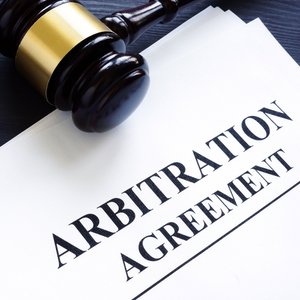Arbitration law and interim reliefs against third parties

This article discusses the scope and power of courts under Section 9 of the (Indian) Arbitration and Conciliation Act, 1996 (the Act), which deals with interim measures that may be granted by the court. Section 9 is worded as follows:
9. Interim measures, etc., by Court –
(1) A party may, before or during arbitral proceedings or at any time after the making of the arbitral award but before it is enforced in accordance with section 36, apply to a court—
(i) for the appointment of a guardian for a minor or person of unsound mind for the purposes of arbitral proceedings; or
(ii) for an interim measure of protection in respect of any of the following matters, namely: –
(a) the preservation, interim custody or sale of any goods which are the subject-matter of the arbitration agreement;
(b) securing the amount in dispute in the arbitration;
(c) the detention, preservation or inspection of any property or thing which is the subject-matter of the dispute in arbitration, or as to which any question may arise therein and authorising for any of the aforesaid purposes any person to enter upon any land or building in the possession of any party, or authorising any samples to be taken or any observation to be made, or experiment to be tried, which may be necessary or expedient for the purpose of obtaining full information or evidence;
(d) interim injunction or the appointment of a receiver;
(e) such other interim measure of protection as may appear to the court to be just and convenient, and the Court shall have the same power for making orders as it has for the purpose of, and in relation to, any proceedings before it.
(2) Where, before the commencement of the arbitral proceedings, a Court passes an order for any interim measure of protection under sub-section (1), the arbitral proceedings shall be commenced within a period of ninety days from the date of such order or within such further time as the Court may determine.
(3) Once the arbitral tribunal has been constituted, the Court shall not entertain an application under sub-section (1), unless the Court finds that circumstances exist which may not render the remedy provided under section 17 efficacious.
There has been some confusion as regards the availability and scope of section 9 of the Act vis-à-vis a third party. While the section itself does not specify the circumstances where interim relief can be granted to third parties, the courts have deliberated in detail on this matter.
One of the earliest instances where the court looked into the scope of section 9 vis-à-vis third parties was in the year 2000 in CREF Finance Limited v. Puri Construction Ltd. & Ors. (CREF Finance Case). In this case, the Delhi High Court granted interim relief against Larsen and Toubro (L&T) even though it was not a signatory to the arbitration agreement. The court observed that L&T had appointed the respondent as its agent, and it was well aware of the terms of the contract between the parties to the arbitration. Accordingly, the court restrained L&T from creating any third-party rights in the property which was the subject matter of the dispute.
In another case of Arun Kapoor v. Vikram Kapoor (2001), the court observed that an application under section 9 of the Act can be initiated against a third party and cannot be limited to the parties to the proceedings. It was further observed that section 9 is distinct from section 17[i] in so much that the remedy under section 9 may lie against a person who is not a party to the arbitration agreement. Section 17 of the Act empowers an arbitral tribunal to grant interim reliefs to any party during the pendency of the arbitral proceedings. The Delhi High Court’s observations in this case has largely been followed by the Delhi High Court and other High Courts across the country.
The power vested in a court through section 9 was exhaustively analyzed by the Delhi High Court in the case of Gatx India. v. Arshiya Rail Infrastructure Ltd (2014). The court held that when the relief granted to the petitioner is in support of the arbitral proceedings and incidentally affects a third party, then such relief is ordinarily within the scope of section 9. However, granting interim reliefs in favour of a third party, which is a complete stranger to the issue, can only be resorted to in extreme cases.
In 2010, the Bombay High Court in Girish Mulchand Mehta v. Mahesh S. Mehta (2010), took a liberal view and held that interim measure affecting a third party is not an impediment to its jurisdiction and it is empowered to do so for the protection or preservation of the subject matter of the arbitration agreement. Similarly, in Tapadiya Construction Ltd., Aurangabad v. Sanjay Suganchand Kasliwal and Anr. (2015) the Bombay High Court held that, an order under section 9 of the Act can be made against a third party if a prima facie case is made out that the subject-matter of arbitration or part of it, is with the third party having no independent right in relation thereof.
There are some instances where the courts have taken a differing view that no reliefs can be granted against a non-signatory / third party under section 9. For instance, the Kerala High Court in Shoney Sanil v. Coastal Foundations (2006), held that the scheme of the Act clearly suggests that the court’s power under section 9 cannot interfere with the rights of third parties. In this case, the respondent sought relief against third party who had obtained interim relief under an independent decree confirming the sale and delivery of possession. The court observed that power under “section 9 has to be exercised in the backdrop of the extent of jurisdiction which can be exercised and, this is limited to the parties who are governed by the arbitration agreement and not in excess.” Thus, interim measures under section 9 can only be granted against the parties to the agreement or any party claiming under it.
Further, in Mikuni Corporation v. UCAL Fuel Systems (2008), the Delhi High Court distinguished the CREF Finance Case and held that the third party in the case had nothing to do with the subject agreement and therefore declined interim reliefs against the third party. Further, in NAFED v. Earthtech Enterprises Ltd. (2009), the Delhi High Court declined interim reliefs against a third party, which was a sister concern of the respondent, on the ground that a petition under section 9 cannot be entertained against a third party and that the petitioner would have the liberty to separately initiate civil or criminal proceedings against a third party.
In a very recent judgement of Vijay Jariwala v Umang Gandhi (6 May 2022), the Gujarat High Court did not grant interim relief to a third party and stated that the only situation where relief can be granted is when such relief is being claimed through the party involved in arbitration.
However, the courts have not provided an exhaustive definition of who qualifies as a “person claiming through or under” a party to the arbitration agreement. In these cases, the decisions were taken on the basis of the degree of relationship between the third party and the subject matter/ party to the arbitration agreement and whether denial of interim relief might frustrate the petitioner’s right in arbitration and/or render the arbitration proceedings infructuous.
Scope of arbitral tribunal
Unlike the courts which have inherent authority to grant interim reliefs against third parties, if one is seeking interim measures from the arbitral tribunal against third parties, problems are likely to arise. This is because arbitration is designed to protect the parties who have entered in arbitration agreement. Since arbitration arises out of an arbitration agreement between the parties, arbitral tribunals will have no jurisdiction over non-signatories to the arbitration agreement. Thus, it is an accepted position that an arbitral tribunal would not have the authority to issue interim relief against a third party.
Our Thoughts
The courts in India are given extensive powers under provisions of Order 1 Rule 10(2) of the Code of Civil Procedure, 1908, allowing them at any stage to implead ‘necessary parties’ i.e., without whom no effective order could be passed at all. Likewise, when acting as a section 9 relief court, it can certainly grant reliefs against third parties affecting the subject matter of arbitration to secure the interests/claims under the dispute. Therefore, it may lead to injustice if the parties are refused interim protection for the sole reason that a party is a non-signatory to the arbitration agreement. This is especially so in cases where companies from the same group are involved.
The information contained in this document is not legal advice or legal opinion. The contents recorded in the said document are for informational purposes only and should not be used for commercial purposes. Acuity Law LLP disclaims all liability to any person for any loss or damage caused by errors or omissions, whether arising from negligence, accident, or any other cause.



